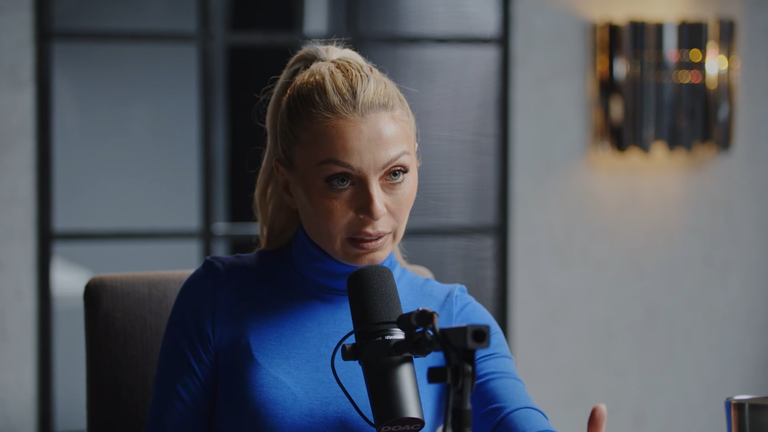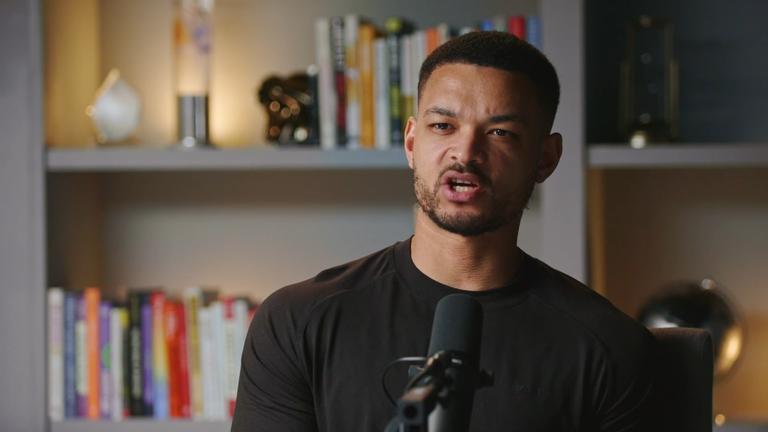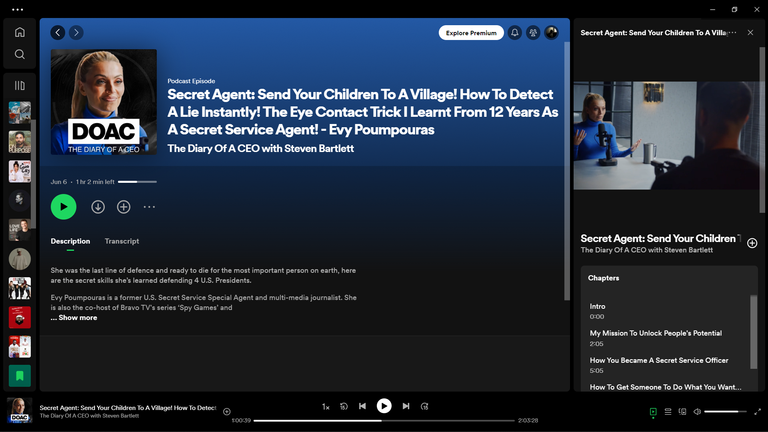Redefinitions and Insights from Evy
I found a new podcast that I will be listening to now. The Diary Of A CEO by Steven Barlett. I have only listened to one episode, but I am already sold on the content there. It was an interesting listen, and there are a few things I pondered over introspectively.

I share some of the podcasts I listen to with people—or publicly at least—and so it felt encouraging to see people consider some of them, give them a listen, and perhaps even become regular listeners as well. And so my brother shared an episode from a podcast that I never knew about, being aware of what I listen to, and that it was a package of profound insights that I was delighted to listen to at the gym.
It was the first time listening to a podcast while I was working out at the gym, by the way, and it felt a little better than listening to songs instead, so I may be doing it a lot more.

A few things that stuck with me listening to the podcast are the different versions of ourselves we create, what leadership truly is (from the perspective of US presidents), how emotions should go out the window to make rational decisions, and what a contribution score is and how it affects how people receive the next contribution you make based on it.
Something I heard that moved me was how we actually kind of allow people to behave the way that they do to us, which we'd term disrespectful. And then, Evy Poumpouras, the guest speaker in the podcast, addressed how it must be assessed if it's actually your ego or if your boundaries have truly been broken.
 |  |
What standards have I set up, or what have I done to let people think that they can do things to me? The things we do and the behaviours we display all give people a manual on how to behave around us. If I show up late to a meeting, I'm giving people one reason to disrespect me in that regard. If I'm lousy and perhaps superfluous in my words and demeanour, that's another.
The environments we create define what people can and cannot do to or around you, to a reasonable extent. You set the tone. And that links up with the contribution score she talked about later on in the podcast.
You see, people generally respond to what you have to say in a group conversation or meeting based on how you have performed with your contributions in the past. Contribution score. There are people that garner a lot of attention, and others take them seriously when they speak or even when they're about to. And there are those people who are just immediately dismissed. It all depends on their level of contribution in the past.

In essence, I was reminded about speaking when I really have something well thought out to say and not just for the sake of wanting to say something. It affects my contribution score, and that often goes a long way.
I am not sure who makes great decisions when they are angry. I know I don't. And the same applies to other kinds of emotions—they can affect how we think, react, and decide on things. And so, according to Evy, who is actually a former secret service agent who worked with US presidents, leaders have to be stoic and not allow emotions to influence their decisions, especially with critical positions like being president of the most powerful nation in the world.

There's a lot more in the podcast episode. It's two hours long. And there are interesting stories Evy shared from her experiences working in the US secret service. You can find the episode here on Spotify.
Posted Using InLeo Alpha
this is really insightful, plus since i joined twitter i prefer listening to there space than actually listening to music . the little moments we get we give our mind an opportunity to listen to a mind building information.
Hmm...I haven't tried that yet. What. X Spaces do you frequent?
I certainly dont know much about her but it's interesting to me how she explains that our reality is shaped by our beliefs and perceptions it makes me think about how much power we have over our own experiences, to be honest its not far from the truth, everything about us and decisions thats up there in our brain although humans emotions make things interesting and at the same time complicated, recently I have been listening to Ali Abdaal he kinda make similar videos about self awareness and emotional resilience, trying to improve some aspects of my day to day😎 ✌️
I never knew her before, too. She has a book that I'd like to read-Becoming Bulletproof.
I'll check Ali Abdaal out. What's one thing that Ali has said that has stuck with you for far?
I don't listen to podcasts but after reading this one I am interested in starting to listen to it. I will try but doubt myself because I am always too lazy to begin a new thing.
In the case of comment, I am still thinking about what to comment because I understood many things but have nothing to say🤔.
It's always like that for most people. It's not something you're used to, so you may not be that zealous at first. For a good start, you may just think of one person you know you've heard of often and check their podcast out. That's a great way to start.
Congratulations @olujay! You have completed the following achievement on the Hive blockchain And have been rewarded with New badge(s)
Your next target is to reach 30000 upvotes.
You can view your badges on your board and compare yourself to others in the Ranking
If you no longer want to receive notifications, reply to this comment with the word
STOPCheck out our last posts:
One thing that stuck out to me while I listened to the podcast was when she spoke about how in different times in here life while she served had different approaches to getting things done.
What would be good to do in one service unit would be totally different and unappreciated and you would have to adapt to the new environment to unlearn and relearn.
Oh, yes. This is one of the many insightful things she said that I missed.
Thank you for sharing the episode with me, brother.